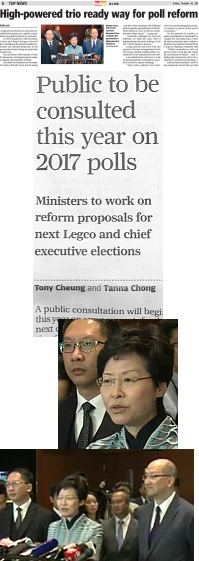 There are, we are helpfully reminded, 36 months to go before the September 2016 Legislative Council poll, and 42 months before the March 2017 Chief Executive election. Assuming that it takes a year to put final arrangements in place, and a year before that for the proposed election methods to be drafted and to pass through the legislature – if they win the required two-thirds of votes – that leaves surprisingly (or perhaps mercifully) little time for the inevitably bitter and cantankerous public consultation exercise that precedes the whole process.
There are, we are helpfully reminded, 36 months to go before the September 2016 Legislative Council poll, and 42 months before the March 2017 Chief Executive election. Assuming that it takes a year to put final arrangements in place, and a year before that for the proposed election methods to be drafted and to pass through the legislature – if they win the required two-thirds of votes – that leaves surprisingly (or perhaps mercifully) little time for the inevitably bitter and cantankerous public consultation exercise that precedes the whole process.
Beijing’s quasi-amendments to the Basic Law make clear that this is all subject to Central Government veto as well. Up until yesterday, there was no sign of a public consultation. Now a ‘high-powered’ constitutional affairs task group suddenly appears on the scene, in the form of the Chief, Justice and Constitutional Affairs Secretaries. They will produce a public consultation document quite swiftly, in order to enable the great debate to start by year’s end.
The delay, and the new-found haste, can be attributed only to Beijing’s officials who are running electoral reform behind the scenes. Their reasoning is anyone’s guess, but we know the Occupy Central civil disobedience campaign is a major worry to them, with its eerily placid and almost blasé approach to challenging and essentially overcoming the civil power. To the Communist-trained paranoiacs it can’t just be a bunch of students and trendy priests threatening to sit in the streets.
So it’s rock-and-a-hard-place for Beijing and its proxies in and around the Hong Kong government. Having to give the Big Lychee’s electorate a say in their choice of leadership is fraught with risk in the Mainland officials’ view, and tiresomely complex for the locals. But Beijing’s representatives fear even greater loss of control if the city’s poor governance continues, and only a few throwbacks and reactionaries in the Hong Kong establishment seriously see the status quo as viable.
The public consultation document will contain no hard proposals. Instead it will repeat all the stuff we have already heard about what changes the Basic Law, Beijing and life in general can (and thus cannot) accommodate. Production will be little more than a layout job, which is why a (say) eight-week deadline is no problem, even allowing for that incredible tower of work already piled up on Carrie Lam’s plate.
Then the fun begins. Many of the pan-democrats have already decided that they will fight to the death for the pointless cause of direct ‘public nomination’ of Chief Executive candidates – clearly ruled out by the Basic Law’s reference to a committee. Around half a dozen more-moderate pro-dems in Legco will need to split from these absolutists to vote a reform bill through. Holding a veto, they could have, in essence, almost as much of a final say as Beijing. Meanwhile, the patriotic crowd are also getting fractious, with some hinting that they think Beijing made a strategic error long ago by estranging the mainstream pro-dems who best represent the local populace.
The establishment camp can ultimately be whipped into line by cadres threatening a dose of re-education or withdrawal of shoe-shining privileges. So a lot comes down to whether a pro-dem group (presumably Democratic Party plus a few reluctant buddies) can back a proposal that attracts majority public opinion and is either acceptable to Beijing’s officials or at least leaves them with no other way forward. Other outcomes don’t really bear thinking about.
I declare the weekend open with the thought that even if we can’t get comprehensive agreement and harmony on electoral reform, at least we could have a Mini-Consensus, as seen recently in Kowloon City…


In one of your links, Gary Cheung, who is usually a rare voice of sanity in the PCMP, wrote: ‘Basic Law Committee member Lau Nai-keung criticised Tsang for urging Beijing to remove “demons” while turning a blind eye to the interference’ by the foreign devils.
It would be hard to make things like this up!
And you wrote: ‘Other outcomes don’t really bear thinking about’ ie not reaching a ‘consensus’ on reform. But this is really the only weapon the pan-dems have: to veto this latest attempt to present a choice between Peking-anointed dummies as being authentic universal suffrage.
” … the new-found haste, can be attributed only to Beijing’s officials who are running electoral reform behind the scenes. Their reasoning is anyone’s guess.”
My guess: An attempt to pour sugar onto the PR disaster brought about by the TV licensing announcement. Didn’t Joe Goebbels once say that ‘a good day for bad news is a good day for good news?’
Property Developer, although the literal translation of the term used by Tsang Yuk Sing is “demons of the heart”, the term could also mean “those things that you can’t let go of”, or “those things that bother you”. By ignoring these more neutral translations, Lau seems to be demonising Tsang in his efforts to shoeshine Beijing.
Char, Thanks for the comment. Nai-keung, or perhaps Gary, or even Yok Sing?
In any case it always amazes me that a single translation of any given phrase — presumably the first one — is therafter treated as gospel, with alternative translations at best ignored and at worst vilified.
I am guessing that the whole public consultation process with be one enormous fudge ( or scam – to put it more accurately).
The govt will put out lots of vague proposals in its consultation paper, hold a lot of meetings , put up with a lot of mini- protest marches ( and perhaps a couple of mega ones) and then announce that the consensus is … wait for it …. sound of rolling drums…
… exactly what Beijing decided to do from the very beginning.
Since no-one will ever actually see what the consultation survey results are, no-one will be able to discredit the consensus view
As no one else said it, I will: the Mini Consensus was fantastic.
Can we please have a public consultation on the Government’s public consultation mechanisms?